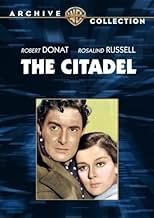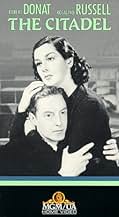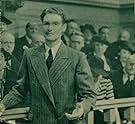VALUTAZIONE IMDb
7,0/10
2483
LA TUA VALUTAZIONE
Aggiungi una trama nella tua linguaAn enthusiastic young doctor happily embarks on his career, but it isn't long before he finds out what being a doctor really entails.An enthusiastic young doctor happily embarks on his career, but it isn't long before he finds out what being a doctor really entails.An enthusiastic young doctor happily embarks on his career, but it isn't long before he finds out what being a doctor really entails.
- Regia
- Sceneggiatura
- Star
- Candidato a 4 Oscar
- 9 vittorie e 4 candidature totali
Penelope Dudley-Ward
- Toppy LeRoy
- (as Penelope Dudley Ward)
Francis L. Sullivan
- Ben Chenkin
- (as Francis Sullivan)
Recensioni in evidenza
A.J. Cronin's book "The Citadel" was adapted for a 1938 film starring Robert Donat, Rosalind Russell, Ralph Richardson, Rex Harrison, and Emlyn Williams, directed by King Vidor.
Donat plays Andrew, a young, idealistic new doctor who goes to work in a small Welsh mining town, where he marries a pretty schoolteacher, Christine (Rosalind Russell). Many of the miners have a persistent cough, and he becomes interested in finding the cause. But the miners have little understanding of the big picture and just want the "pink medicine" the old doctor gave them, which just helped their symptoms.
Thwarted at every turn, Andrew and Christine move to London, where Andrew opens a practice. Then he has a change of fortune when he runs into an old friend (Rex Harrison) who gets him on the society doctor track, where he gets big money for treating hypochondriacal patients and by merely being present while a surgery is being performed, or taking a referral.
A beautiful movie with the underrated Donat turning in a wonderful performance of quiet intensity. Russell's expressions say more than her words - you know exactly how she's feeling. Ralph Richardson -- was he ever bad? - plays Andrew's old friend Denny, who notices the change in Andrew's goals.
A.J. Cronin was one of the authors whose novels were often adapted for film in the old days: "The Spanish Gardener," "The Green Years,", "Keys of the Kingdom," "Bright Victory," "Vigil in the Night," and others. Some of his stories involve medicine/science and sacrifice/dedication. Those books made for some inspiring films in the '30s and '40s.
Donat plays Andrew, a young, idealistic new doctor who goes to work in a small Welsh mining town, where he marries a pretty schoolteacher, Christine (Rosalind Russell). Many of the miners have a persistent cough, and he becomes interested in finding the cause. But the miners have little understanding of the big picture and just want the "pink medicine" the old doctor gave them, which just helped their symptoms.
Thwarted at every turn, Andrew and Christine move to London, where Andrew opens a practice. Then he has a change of fortune when he runs into an old friend (Rex Harrison) who gets him on the society doctor track, where he gets big money for treating hypochondriacal patients and by merely being present while a surgery is being performed, or taking a referral.
A beautiful movie with the underrated Donat turning in a wonderful performance of quiet intensity. Russell's expressions say more than her words - you know exactly how she's feeling. Ralph Richardson -- was he ever bad? - plays Andrew's old friend Denny, who notices the change in Andrew's goals.
A.J. Cronin was one of the authors whose novels were often adapted for film in the old days: "The Spanish Gardener," "The Green Years,", "Keys of the Kingdom," "Bright Victory," "Vigil in the Night," and others. Some of his stories involve medicine/science and sacrifice/dedication. Those books made for some inspiring films in the '30s and '40s.
This is a wonderful film that deserves to be seen by a wider audience than it currently receives. The screenplay of "The Citadel" is excellent and deals with issues that have a continuing relevance today. Indeed, its theme--the importance of having a strong sense of vocation and integrity --especially among medical doctors, will probably always retain its original significance.
Robert Donat plays a physician who starts out as an idealistic young man working in a poor Welsh coal mining district, but after a series of disappointments he leaves and becomes a cynical member of a London clinic for rich patients, practising the kind of assembly line medicine that is all too common today in many countries. It is likely, however, that the film had a definite influence in countries like the United Kingdom and Canada, which developed publicly-funded medical plans after World War Two.
But even the best universal health care systems can still be prone to such problems as inequities in the availability or quality of treatment and incompetent or uncaring doctors, interested only in making money. Moreover, the issues of professional ethics, individual conscience and personal commitment are applicable to many other occupations, as we've recently seen in the cases of corrupt corporations, such as Enron, which have also abused people's trust.
The other main virtue of this film lies in the acting of Robert Donat. Sir Laurence Olivier once stated that Robert Donat would have been a greater actor than Olivier himself was, had it not been for the chronic asthma that plagued Donat throughout his life and ultimately killed him. That terrible respiratory illness may have inspired him, in "The Citadel," to give one of the most sensitive and moving performances I have ever seen on film, during the scene in which Dr. Manson gets a baby, thought to have died, to breath again.
Donat's complete mastery of what the legendary Konstantin Stanislavsky called "tempo-rhythmn" gives a palpable urgency to this scene that is unforgettable. Watch his delicate and expressive use of his hands while he works to save the infant he's holding. These are the hands of a great actor giving life to a scene, and, at the same time, the hands of a great doctor giving life to a child.
This is acting of the highest order, and if you want to see what the real "Stanislavsky Method" (and not the inferior misinterpretation of it by Lee Strasberg) was all about, Donat's performance in this scene remains as magnificent a demonstration of its goal of emotional truth as I have ever witnessed in many years of watching theatre and film. The rest of his performance is equally brilliant. The changes in his face perfectly convey the degrees by which the former idealist becomes a jaded opportunist, and then. . .
Well, I don't want to be a spoiler and give the whole story away! I highly recommend "The Citadel" to anyone who enjoys films that have real meaning, or who appreciates the true, and truthful, art of acting--acting that is so brilliant and free from any trace of mannerism and artifice that we forget we're watching acting at all. We're seeing life and art unfold together. Thanks to the talent of Robert Donat, form and content become one: his concern with integrity and the film's concern with it simply merge into an inseparable artistic unity. This is a cinematic experience that nobody should miss.
Robert Donat plays a physician who starts out as an idealistic young man working in a poor Welsh coal mining district, but after a series of disappointments he leaves and becomes a cynical member of a London clinic for rich patients, practising the kind of assembly line medicine that is all too common today in many countries. It is likely, however, that the film had a definite influence in countries like the United Kingdom and Canada, which developed publicly-funded medical plans after World War Two.
But even the best universal health care systems can still be prone to such problems as inequities in the availability or quality of treatment and incompetent or uncaring doctors, interested only in making money. Moreover, the issues of professional ethics, individual conscience and personal commitment are applicable to many other occupations, as we've recently seen in the cases of corrupt corporations, such as Enron, which have also abused people's trust.
The other main virtue of this film lies in the acting of Robert Donat. Sir Laurence Olivier once stated that Robert Donat would have been a greater actor than Olivier himself was, had it not been for the chronic asthma that plagued Donat throughout his life and ultimately killed him. That terrible respiratory illness may have inspired him, in "The Citadel," to give one of the most sensitive and moving performances I have ever seen on film, during the scene in which Dr. Manson gets a baby, thought to have died, to breath again.
Donat's complete mastery of what the legendary Konstantin Stanislavsky called "tempo-rhythmn" gives a palpable urgency to this scene that is unforgettable. Watch his delicate and expressive use of his hands while he works to save the infant he's holding. These are the hands of a great actor giving life to a scene, and, at the same time, the hands of a great doctor giving life to a child.
This is acting of the highest order, and if you want to see what the real "Stanislavsky Method" (and not the inferior misinterpretation of it by Lee Strasberg) was all about, Donat's performance in this scene remains as magnificent a demonstration of its goal of emotional truth as I have ever witnessed in many years of watching theatre and film. The rest of his performance is equally brilliant. The changes in his face perfectly convey the degrees by which the former idealist becomes a jaded opportunist, and then. . .
Well, I don't want to be a spoiler and give the whole story away! I highly recommend "The Citadel" to anyone who enjoys films that have real meaning, or who appreciates the true, and truthful, art of acting--acting that is so brilliant and free from any trace of mannerism and artifice that we forget we're watching acting at all. We're seeing life and art unfold together. Thanks to the talent of Robert Donat, form and content become one: his concern with integrity and the film's concern with it simply merge into an inseparable artistic unity. This is a cinematic experience that nobody should miss.
10madshell
A morality tale of medicine, this film brilliantly illustrates the plight of a doctor who truly cares for healing the sick -- yet even finds his patients to be dishonest. Robert Donat is superb in his transformation from a good doctor to a money making doctor for the rich. Roselyn Russell compliments his performance with her own emotional struggle, as she watches her husband all but lose his heart. Brilliant direction from early veteran director King Vidor gives this film a worthy place in film history. This is a must see for any doctor -- IMHO.
Very good film from King Vidor with a great look and a mostly excellent cast, take from the classic novel by A Cronin. Robert Donat as Dr. Manson, a highly-principled physician who struggles with the conflicting demands of his profession, provides an uneven central performance. It is sometimes hard to understand his motivations and this is the film's biggest weakness. Rosalind Russell does a fine job as his ever-faithful, often suffering wife. Her performance is perfect, and does provide a moral core to the film. The film wisely avoids a lot of details of the novel that would have muddied up the storyline. (In the book, Dr. Manson has an affair with one of society patients.) The film also boasts some fine performances from a very young Rex Harrison and Ralph Richardson. In fact, Richardson's role as an idealistic, though flawed doctor steals the spotlight every time he is on the screen. The film also has a great look, especially the outdoor scenes of the British villages.
"The Citadel" is one of those circular morality fables - idealistic young man sets out full of good intentions to put the world to right, but, finding his dreams dashed by prejudice and ignorance, throws in his lot with the protection of an easy but dishonest life only to realise the error of his ways through personal tragedy with consequent redemption. A;though stylistically and culturally a world apart, it is thematically a precursor of Mizoguchi's "Sansho Dayu". Made in great Britain in 1938, its MGM backing certainly shows in higher production values than most home grown films of the period - and this in spite of much reliance on back projection of the sort that even the great Carol Reed could not always effectively disguise. One of Hollywood's top directors, King Vidor, invests it with visual quality and, in a part that could have been tailored for Greer Garson, Rosalind Russell makes a surprisingly convincing female lead, supporting the hero throughout his tribulations with every ounce of Garsonian understanding he needs. But it is Robert Donat as the idealistic doctor, who first tries his professional hand in the dark Welsh colliery valley, that is the film's greatest strength. Here was an actor who brought a sense of dignity and integrity to every role he undertook from the earliest Richard Hannay to the Chinese nobleman in "The Inn of the Sixth Happiness" which he was brave enough to play when he was literally gasping for breath. His performance in "The Citadel" is not entirely free from cliché but I imagine this was something imposed by the conventions of the period. How else to explain that when he becomes mean and mercenary he suddenly sports a very short and unsympathetic moustache which, if memory serves me right, miraculously disappears for the final scene of redemption. For the rest there is a galaxy of British acting talent to be found among the supporting roles with a brief glimpse of the dignified Nora Swinburne and a few more of a youthful Francis L. Sullivan doing his obese bigot stuff with rather less brains than usual. And as if this was not all, there is "Sexy Rexy" Harrison gracing the Harley Street scene, Cecil Parker playing a particularly odious surgeon who would no doubt be struck off the Medical Register if he were around today and the great Ralph Richardson investing the role of Donat's best friend with just about the right amount of Shakespearean rhetoric that the part will support. All in all a veritable treat provided you suspend just a little bit of disbelief.
Lo sapevi?
- BlooperWhen Andrew examines Christine's throat, he sits in front of a light that is supposedly reflected into Christine's mouth by his eyepiece. We see this from over Andrew's shoulder, and when the light is directed into her mouth, it is clearly coming from behind Andrew, because the back of his eyepiece is illuminated.
- Citazioni
Christine Barlow Manson: Andrew, Do you remember once telling me that a all good research man needed was a notebook, a microscope and a room with a roof over it?
- Curiosità sui creditiPrologue: "This motion picture is a story of individual characterizations and is in no way intended as a reflection on the great medical profession which has done so much towards beating back those forces of nature that retard the physical progress of the human race."
- Versioni alternativeAlso shown in computer colorized version.
- ConnessioniFeatured in The Ultimate Film (2004)
I più visti
Accedi per valutare e creare un elenco di titoli salvati per ottenere consigli personalizzati
- How long is The Citadel?Powered by Alexa
Dettagli
- Tempo di esecuzione1 ora 50 minuti
- Colore
- Proporzioni
- 1.37 : 1
Contribuisci a questa pagina
Suggerisci una modifica o aggiungi i contenuti mancanti






































